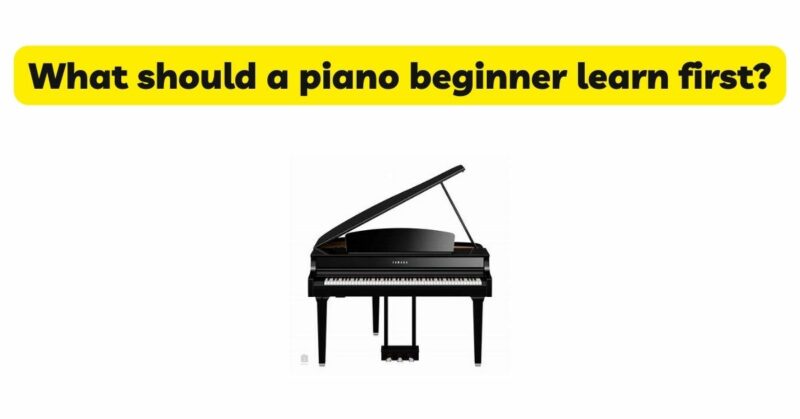Embarking on the journey of learning the piano as a beginner can be both exciting and overwhelming. With so many aspects to consider, it’s crucial to understand the foundational skills that lay the groundwork for progress and success. In this article, we will explore the essential elements that beginners should focus on when starting their piano journey. By prioritizing these key areas, beginners can build a strong foundation and develop the skills necessary for future growth.
- Keyboard Familiarity: Before diving into the technical aspects of playing the piano, it’s important to become familiar with the keyboard itself. Identify the white and black keys, understand the concept of octaves, and navigate the keyboard confidently. Developing this basic familiarity with the instrument is the first step toward playing the piano effectively.
- Proper Hand Position: Establishing proper hand position is crucial from the very beginning. Beginners should learn to position their hands correctly on the keyboard, maintaining a relaxed but firm posture. Pay attention to hand and finger placement, keeping wrists level with the keys to avoid tension and facilitate fluid movement.
- Basic Music Theory: Learning basic music theory is essential for any beginner pianist. This includes understanding musical notation, reading sheet music, and recognizing key signatures and time signatures. Familiarize yourself with the staff, clefs, note values, and the concept of rhythm. A solid grasp of these foundational elements will set you up for success in playing music.
- Finger Exercises: Developing finger strength, dexterity, and independence is crucial for piano playing. Beginners should incorporate finger exercises into their practice routine. Exercises such as scales, arpeggios, and finger drills help strengthen the fingers, improve coordination, and develop proper technique. Practice these exercises regularly to build a solid technical foundation.
- Basic Technique: Alongside finger exercises, beginners should focus on basic piano technique. This includes learning how to strike the keys with the appropriate touch and control. Pay attention to hand movements, using the fingertips to produce a clear and resonant sound. Begin practicing proper legato (smooth) and staccato (short and detached) techniques to develop control over the keys.
- Simple Songs and Melodies: Engaging with simple songs and melodies is an exciting way for beginners to apply their growing skills. Start with easy and familiar tunes, such as nursery rhymes or simple folk songs. Playing these melodies helps reinforce finger placement, note reading, and rhythm. It also introduces beginners to the joy of playing recognizable music from the early stages.
- Basic Chords and Harmony: Understanding basic chords and harmony is essential for playing a wide range of music styles. Begin by learning major and minor triads, which are the building blocks of chords. Experiment with different chord progressions and explore how chords harmonize with melodies. This knowledge forms the basis for accompanying songs and improvisation.
- Sight-Reading Skills: Sight-reading is the ability to play music from sheet music without prior preparation. Beginners should gradually develop their sight-reading skills by practicing simple pieces at a comfortable level. Start with easy exercises and gradually progress to more complex pieces. Regular sight-reading practice enhances note recognition, rhythm comprehension, and overall fluency at the piano.
- Basic Music Interpretation: Even as a beginner, it’s important to start developing musical interpretation skills. Begin by exploring dynamics (loudness and softness), tempo (speed), and articulation (legato and staccato). Experiment with different musical phrasing and try to convey emotions and expressiveness in your playing. Developing a sense of musicality from the early stages sets the foundation for expressive and engaging performances.
- Regular Practice Routine: Establishing a regular practice routine is crucial for consistent progress. Set aside dedicated practice time each day and create a schedule that works best for you. Aim for shorter, focused practice sessions rather than long, unfocused ones. Regular practice reinforces muscle memory, improves finger strength, and accelerates learning.
- Patience and Persistence: Learning the piano is a journey that requires patience and persistence. Understand that progress takes time and that each small achievement brings you closer to your goals. Embrace the challenges, celebrate your successes, and maintain a positive mindset throughout your learning journey. Remember that consistency and dedication are key to mastering the piano.
Conclusion: As a beginner pianist, focusing on these essential skills will set you on the right path toward becoming a proficient player. Develop familiarity with the keyboard, establish proper hand position, and immerse yourself in basic music theory. Incorporate finger exercises, technique, and simple songs to build your technical foundation. Gradually work on sight-reading, chord progressions, and musical interpretation. Above all, maintain a regular practice routine and embrace patience and persistence. By prioritizing these foundational skills, you’ll lay a solid groundwork for continued growth and enjoyment in your piano playing journey.


